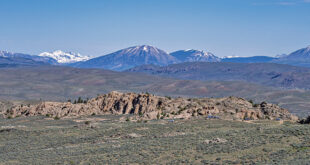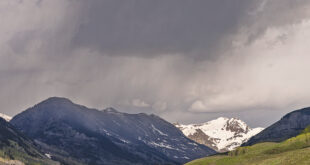The idea of an “empty house tax” certainly has people talking. It has generated letters to the paper from all sides for many weeks. It is a topic on social media as well. The Crested Butte Town Council will start talking more deeply about the idea at the upcoming Monday council meeting and deeper conversation is certainly in order before action is taken. First off, the conversation should include those who will feel the brunt of any new tax and not just those that might benefit.
When first hearing of the idea, I initially expressed some discomfort but couldn’t explain what that discomfort was. As I’ve thought about it, it is the element of community and division that bothers me. The perhaps unintended consequence that it might shift the view of the local community to more of a commodity—and that’s something no one really wants. Like it or not, communities like Crested Butte are made up of different legs that keep the communal stool standing and second homeowners are one of those important legs. Like it or not, this community as a whole is made up of more than just your friends.
I’ve always considered this place fairly egalitarian. As in most communities with resorts, there are three major demographics that make up the whole: the locals who live and work here; the vacation homeowners who embrace the place close to their heart and probably wish they lived here; and the tourists who come and visit the place for a few days at a time. All three matter in a place like Crested Butte for it to be successful. The entire valley, including Crested Butte, has a pretty nice balance of not being too over the top in fantasy resort land and not too controlled by outside forces based in money. Decisions are still made for the overall betterment of the people who appreciate and respect the place and not simply to add more dollars to the bank account.
Now it has certainly changed in recent years and gentrification is part of the new Crested Butte, where it is harder to be a ski bum. When I first got here everyone sort of mingled together at happy hour whether they were a lift op, the bank president or a rich second homeowner. That still happens but cliques are more evident than 20 or 30 years ago. There are more divisions now and some recent immigrants have a, shall we say, scratchier demeanor than the old Texas and Oklahoma transplants. The scratchiest of the newbies usually feel uncomfortable and move on to other places, so it still is a place where money is not the primary element of social status. It is still much more a textured community than a commodity.
And it is that perspective that I fear could be damaged with the “empty house tax” proposal. It turns the second homeowner element of the community equation into pure commodity. Despite protestations, this tax idea would likely create an “us versus them” division unless a lot of hard work and communication is taken by the town council. They are the politicians after all so it is their job, not the staff’s, to do that work. Inclusively reaching out to the folks who would be taxed to see if they have better ideas would be a good first step that should have started already. Explaining the situation and how it impacts them is better than starting with the threat of another tax.
The front page of last week’s paper highlighted details of the new Crested Butte Center for the Arts and the soon-to-be-completed Long Lake land exchange deal. Those endeavors add culture, open space and affordable housing elements to the valley. A lot of the money that made those deals possible came from second homeowners who love this place and feel a visceral connection to Crested Butte.
A lot of the reason we have so many great restaurants, such interesting art, myriad coffee options, sweet trails and successful non-profits is because all three elements of the community support them in the best way they can. We would not have nearly the quality and quantity of choices we do if Crested Butte were a place focused on making widgets and if just 1,800 working locals ever came here.
All three demographics contribute to the whole. For many locals it might be volunteering somewhere and eating out in October when the lines are gone. For second homeowners, it might be opening the wallet and eating out several times a week in July, August, December and March and donating to causes they utilize, such as arts or recreation. For tourists, it could simply be visiting once a year to soak up the vibe and spending money that goes toward wages and rents. I know both locals and second homeowners who fit the best of the bill in terms of volunteerism and financial contributions. I know both locals and second homeowners full of crappy attitude and entitlement. There is no ‘one size fits all’ in a community like Crested Butte.
Most working locals will use both the Center and Long Lake in the future and neither deal would have happened without second homeowners. The locals get to live most of the year in a small town but still have access to sophisticated amenities we couldn’t nearly pay for on our own. We get the year-round benefit of those amenities and the tourists and second homeowners get to use them when they are here for a few days or weeks at a time. It’s not a bad deal for anyone as long as balance is maintained. It seems to me the “empty house tax” throws that balance more out of whack.
If the council can articulate a problem that can be specifically solved with this revenue stream, they could perhaps entice support from those who have a house and love for the community but don’t live or vote here. A generic plea to fund affordable housing or climate change action is probably too broad to garner much support from those impacted. I’m not saying such a tax wouldn’t pass but I question the long-term consequences.
You want to do something really strange but very old-school Crested Butte? Proponents on the council have the addresses and contacts of all those empty homes, so do the hard work and reach out and explain to the owners the benefit of having them pony up for a specific affordable housing or climate change project. Explain why they should contribute $1,000 or $5,000 to a town project and see how persuasive your argument is. There is obvious benefit to vacation homeowners of having workers live in Crested Butte. If there’s a convincing need and an actual project to mitigate that need, I think many of these folks would step up. See what other ideas they might have that attain the same result.
I had suggested to some that the holiday period was a good time for champions of the tax to engage those second homeowners who were in town. A cocktail and conversation party perhaps? I am not aware that any such outreach took place. I’ve also suggested that if there is a need for a new tax to fund affordable housing or climate change projects, then any “empty house tax” should actually be imposed on all houses—with some sort of tax discount implemented on homes that are occupied more than X-weeks per year. If you believe everyone could benefit from such a tax, everyone should have a bit of skin in the game.
I get that wealthier people are buying up old houses for vacation homes or to buying them to live here in a more upscale house. That displaces the lower-income workforce and that’s not a positive. But all the local government entities understand the situation and are actively addressing it as the free market eats up the old ski bum shacks.
There are ways for a strong community to address major problems. Crested Butte has done it before and can do it again. The best ideas are formed through inclusivity and communication. Like it or not, ostracizing one of the elements that actually helps make up this strong whole community is not the best way to start.
—Mark Reaman
 The Crested Butte News Serving the Gunnison Valley since 1999
The Crested Butte News Serving the Gunnison Valley since 1999






